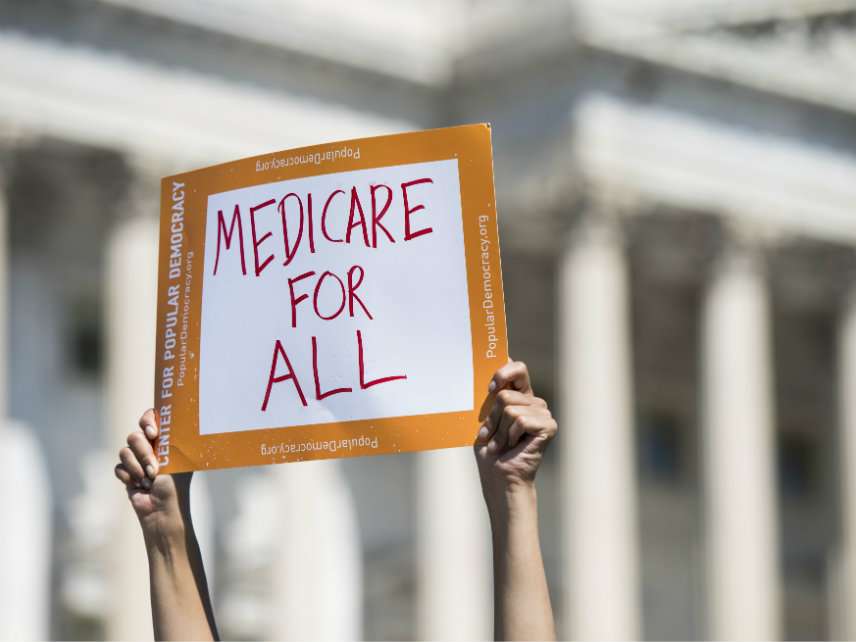Even Democrats Are Divided Over Medicare For All
The single-payer fight is pitting moderate Democrats against progressives, partly because of Obamacare.

In some ways, Medicare for All is on a roll. Polls show increasing public support for the idea, if not a clear sense of what it means, and Democrats in Congress—especially the expected presidential frontrunners—are increasingly willing to endorse the idea. It's likely that it will figure prominently into the 2020 presidential campaign. As one recent article in Health Affairs, a kind of Bible for health policy wonks, stated, "Medicare for All, though difficult, is now within the realm of political possibility."
I wouldn't be quite so sure, at least not in the very near future, because despite surging enthusiasm for the slogan, the practical and political problems with single-payer health care haven't changed. It's expensive, but there's no agreement among proponents about how, or even whether, to finance it. Transitioning millions of Americans from employer plans to a government-run system would be, at best, a massive administrative challenge, and more likely a bureaucratic nightmare—think Brexit, but for health care. Well-funded industry groups would vehemently oppose it. And even Democrats in Congress aren't all on board.
As Politico reported earlier this week, Medicare for All is an issue that divides congressional Democrats, and some of the same advocacy groups that funded defenses of Obamacare, some of which employ or have close ties with Democratic political operatives, are now pushing back on single-payer. And part of the reason, it turns out, is Obamacare.
That's because Obamacare funneled a signficant amount of money to hospitals and insurers, while a single-payer system like the one proposed by Sen. Bernie Sanders (I-V.T.) would cut provider payments and largely put private health insurers out of business. Taxing the rich won't provide nearly enough money to fund $32 trillion in new government spending, and the most straightforward potential financing mechanism—requiring employers to fund Medicare for All—would still be a difficult political lift.
So it's not exactly a surprise that even single-payer proponents like Rep. Frank Pallone (D-N.J.), the incoming chair of the House Energy and Commerce Committee, have been upfront about the fact that, at the moment, the votes simply don't exist.
That's why I basically agree with The Washington Examiner's Philip Klein when he warns single-payer opponents against focusing too much on the phantom threat of Medicare for All. Putting too much energy into fighting an idea that has little chance of becoming reality, he argues, is likely to make less drastic (but still substantial) expansions of government into the health care sector come across as more politically palatable.
The Medicare for All push may not be realistic in the short term, but it's not too hard to imagine Democrats coalescing around something like a Medicare buy-in program or a public option, in which government would offer an insurance plan alongside regulated private coverage. In this scenario, Medicare for All would play the too-radical, too-progressive foil to some sort of still-significant expansion of the health care state, allowing it to appear to be a middle-ground compromise.
The problem, at least for Republicans and their backers, is that opposing Medicare for All and its various congressional apostles makes for easy politics, and, just as crucially, it allows GOP lawmakers to pretend they have something that they don't — a health care policy vision of their own.
Ask a typical Republican about health policy right now, and you're likely to hear essentially empty catchphrases like "patient-centered" and "preserving the doctor-patient relationship" that have little in the way of policy substance behind them, and certainly don't contain a holistic vision for how American health care should be financed and regulated. Behind the scenes, meanwhile, conservative health care wonks spend a lot of time squabbling amongst themselves over both policy particulars and messaging; yes, there are real points of agreement, but they are united most strongly by what they are against. It doesn't help that President Trump has effectively declared Medicare, the nation's largest health care entitlement, off limits to reform.
Which means that the fight will inevitably come down to the forces on the left that support single-payer, or something closer to it, and forces on the right that basically support doing more or less what we are doing now, with all the frustrations and follies that entails.
Maybe that's a sustainable political equilibrium, in which the health policy status quo remains widely disliked but wins by virtue of being too big and too complex to overhaul. But more likely, I think, is that the single-payer forces win a game of inches, not in a year or two or even four, but perhaps in 10 or 20, when less-divided Democrats have either worked through their issues or just collectively agreed to ignore them—and Republicans are as clueless and flat-footed as ever. Medicare for All's moment has (probably) not arrived. But if its opponents don't offer an alternative, it might well be on its way.


Show Comments (110)